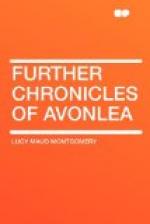So she talked of him, me sitting there and holding her, with her lovely hair hanging down over my arm, and my heart aching so for her that it hurt bitter. She didn’t feel as bad as I did, because she’d made up her mind what to do and was resigned. She was going to marry Mark Foster, but her heart was in France, in that grave nobody knew of, where the Huns had buried Owen Blair—if they had buried him at all. And she went over all they had been to each other, since they were mites of babies, going to school together and meaning, even then, to be married when they grew up; and the first words of love he’d said to her, and what she’d dreamed and hoped for. The only thing she didn’t bring up was the time he thrashed Mark Foster for bringing her apples. She never mentioned Mark’s name; it was all Owen—Owen—and how he looked, and what might have been, if he hadn’t gone off to the awful war and got shot. And there was me, holding her and listening to it all, and her stepma sleeping sound and triumphant in the next room.
When she had talked it all out she lay down on her pillow again. I got up and went downstairs to light the fire. I felt terrible old and tired. My feet seemed to drag, and the tears kept coming to my eyes, though I tried to keep them away, for well I knew it was a bad omen to be weeping on a wedding day.
Before long Isabella Clark came down; bright and pleased-looking enough, SHE was. I’d never liked Isabella, from the day Phillippa’s father brought her here; and I liked her less than ever this morning. She was one of your sly, deep women, always smiling smooth, and scheming underneath it. I’ll say it for her, though, she had been good to Phillippa; but it was her doings that my dearie was to marry Mark Foster that day.
“Up betimes, Rachel,” she said, smiling and speaking me fair, as she always did, and hating me in her heart, as I well knew. “That is right, for we’ll have plenty to do to-day. A wedding makes lots of work.”
“Not this sort of a wedding,” I said, sour-like. “I don’t call it a wedding when two people get married and sneak off as if they were ashamed of it—as well they might be in this case.”
“It was Phillippa’s own wish that all should be very quiet,” said Isabella, as smooth as cream. “You know I’d have given her a big wedding, if she’d wanted it.”
“Oh, it’s better quiet,” I said. “The fewer to see Phillippa marry a man like Mark Foster the better.”
“Mark Foster is a good man, Rachel.”
“No good man would be content to buy a girl as he’s bought Phillippa,” I said, determined to give it in to her. “He’s a common fellow, not fit for my dearie to wipe her feet on. It’s well that her mother didn’t live to see this day; but this day would never have come, if she’d lived.”
“I dare say Phillippa’s mother would have remembered that Mark Foster is very well off, quite as readily as worse people,” said Isabella, a little spitefully.




